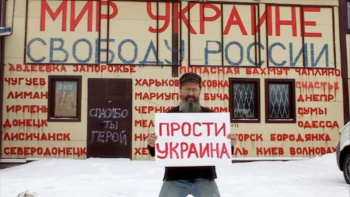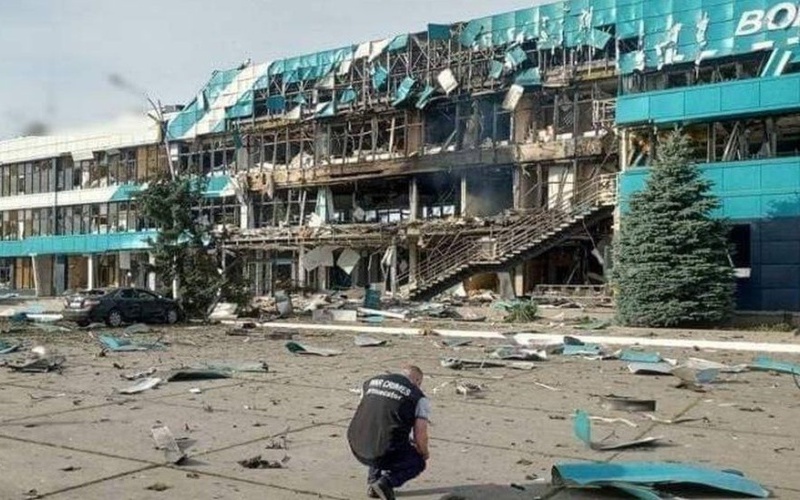Damage to the Ukraine port of Izmail from Russian drone strikes, August 2, 2023
Wednesday’s Coverage: Russia’s Failed Drone Attack on Kyiv

Map: Institute for Study of War
UPDATE 1415 GMT:
A grocery store owner near St. Petersburg, Dmitry Skurikhin, has been sentenced to 18 months in prison over his anti-war statements.
Skurikhin, 48, began featuring slogans and posters on the facade of his store after Russia’s occupation of Crimea in 2014. He was repeatedly fined and the shop’s walls vandalized.
On February 25 this year, Skurikhin was arrested for staging a one-man picket on the first anniversary of Vladimir Putin’s invasion of Ukraine. he was accused of discrediting the Russian military.

UPDATE 1405 GMT:
Col. Gen. Mikhail Teplinsky, the commander of Russia’s Airborne Forces, says at least 8,500 members have been wounded during Vladimir Putin’s 17-month invasion of Ukraine.
The statement, in a video marking Paratroopers’ Day, was a rare acknowledgement of casualties by a Russian official.
“More than 5,000 wounded paratroopers returned to the front after treatment, and more than 3,500 of our wounded refused to leave the frontline,” Teplinsky declared.
Hours later, the statement was withdrawn from both the website and the Telegram channel of the Defense Ministry-run Zvezda.
UPDATE 1346 GMT:
Ukraine President Volodymyr Zelensky visited the Zakarpattia region, in the far west of the country and bordering Hungary, on Wednesday.
Zelenskiy held meetings on “strategic border” and economic issues, facilities for the rehabilitation of soldiers, business relocation, and job creation. He declared that the region “will be one of the drivers of economic and social growth”.
In the city of Berehove, Zelesnkiy met Ukraine’s Hungarian community and presented honors to soldiers.
“We are all citizens of Ukraine: ethnic Hungarians, ethnic Ukrainians, and all our other national communities,” he declared.
Continuing his tour of the west, Zelenskiy visited wounded soldiers in a hospital in Ivano-Frankivsk on Thursday.
UPDATE 1329 GMT:
Romania says it is clearing customs in the next 48 hours for up to 30 ships waiting to enter the country from Ukrainian ports on the Danube River.
On Wednesday, a Russian drone assault damaged Ukrainian grain storage and port facilities at Izmail, across the river from Romania. Romanian President Klaus Iohannis said the Russian attacks against Ukraine’s civilian infrastructure on the Danube are war crimes.
Ukrainian officials have spoken of a “grain corridor” through Romania, following Vladimir Putin’s reimposition of a Russian blockade in the Black Sea two weeks ago.
Danube ports accounted for about 25% of Ukraine’s grain exports before Putin ripped up the July 2022 grain deal.
UPDATE 1029 GMT:
Poland’s Prime Minister Mateusz Morawiecki says Russia’s Wagner Group mercenaries, some of whom are now in Belarus, are moving closer to the Polish border.
Wagner’s fighters transferred to Belarus under a deal with the Kremlin, ending the group’s rebellion, capture of Rostov-on-Don, and advance on Moscow on June 23-24.
With the mercenaries training with the Belarus national army, Poland has begun deployment of more than 1,000 troops closer to the border. On Tuesday, Warsaw said Belarus had violated Polish airspace with military helicopters.
“We need to be aware that the number of provocations will rise,” Mateusz Morawiecki said after meeting Lithuanian President Gitanas Nausėda in eastern Poland. “The Wagner Group is extremely dangerous and they are being moved to the eastern flank to destabilize it.”
Nausėda said the number of Wagner fighters in Belarus could be higher than 4,000.
We must not only talk about measures at the national level but also…what should be done if this situation becomes even more complicated, including the closure of the border with Belarus
This should be done in a coordinated manner between Poland, Lithuania and Latvia.
UPDATE 1025 GMT:
The Ukraine Air Force says it shot down all 15 attack drones fired by Russia overnight.
UPDATE 0705 GMT:
Three civilians and four emergency service workers have been injured in a Russian “double tap” attack on a cathedral in Kherson city in southern Ukraine.
The Russians fired on the cathedral in the center of Kherson, injuring three people traveling on a trolleybus past the building.
As the emergency services tried to extinguish fire from the shelling, the Russians struck again.
A broken roof of St. Catherine's Cathedral, smashed windows in a Christian center, a hole in a house: the consequences of the shelling of Kherson by the Russian army on 3 August.
📷Suspilne pic.twitter.com/BwrMJpOlT0
— Euromaidan Press (@EuromaidanPress) August 3, 2023
UPDATE 0654 GMT:
A Yale University report concludes that
residents in occupied eastern and southern Ukraine are being forced to accept Russian citizenship.
The researchers examined the occupied areas of Luhansk and Donetsk in the east and Kherson and Zaporizhzhia in the south. They found that those who refused Russian citizenship “are subjected to threats, intimidation, restrictions on humanitarian aid and basic necessities, and possible detention or deportation”.
These laws and tactics violate international law, including the prohibition on discrimination against people living under occupation based on nationality, and forcing people to declare allegiance to an occupying power, both illegal under the Hague Convention and the Geneva Conventions.
Nathaniel Raymond, the executive director of Yale School of Public Health, said Russian officials were committing “classic war crimes in the sense that they are restricting or limiting through this process people’s ability to access critical services and resources…such as healthcare, and humanitarian systems”.
Russia claims that it has issued passports to more than 3 million Ukrainians since the occupation of Crimea in 2014 and the seizure of territory in its 17-month invasion.
UPDATE 0649 GMT:
Russia has attacked Kyiv with drones for the eighth consecutive night.
The Russians again failed to strike targets with the Iranian-made Shahed “kamikaze” drones.
Serhiy Popko, head of the Kyiv military administration, said air defenses intercepted about 18 drones. There are no reports of casualties or “destruction” so far.
ORIGINAL ENTRY: Russia highlighted its war on global food supplies on Wednesday, destroying almost 40,000 tons of grain in drone strikes on the ports of Odesa and Izmail in southern Ukraine.
Moscow has stepped up its targeting of port facilities and grain warehouses since July 17, when Vladimir Putin ripped up the July 2022 deal lifting Russia’s blockade on three Ukrainian Black Sea ports.
Thursday’s strikes demolished grains destined for China, Israel, and countries in Africa.
Ukraine Infrastructure Minister Oleksandr Kubrakov said, “The world must resist. Attacks on Ukrainian ports are a threat to the world.” He appealed for more donations of air defense equipment.
Romanian Prime Minister Klaus Iohannis, whose country is just across a river from the port of Izmail, tweeted:
Russia's continued attacks against the Ukrainian🇺🇦 civilian infrastructure on #Danube, in the proximity of Romania🇷🇴, are unacceptable. These are war crimes and they further affect UA's capacity to transfer their food products towards those in need in the world.
— Klaus Iohannis (@KlausIohannis) August 2, 2023
With the strike on Izmail, the Russians may also been seeking to reinforce their Black Sea. Defying Moscow’s threats, at least three and up to six ships had reached the port, overseen by NATO surveillance aircraft and helicopters.
Russia Exploiting “Vulnerable Countries”
The European Union called out the Kremlin’s tactics, warning other countries in a letter that Russia — even as it bombs global supplies — is offering cheap grain to African nations to tie them to Moscow.
EU foreign policy chief Josep Borrell urged the countries to speak “with a clear and unified voice”, pressing Moscow to return to the July 2022 deal.
As the world deals with disrupted supplies and higher prices, Russia is now approaching vulnerable countries with bilateral offers of grain shipments at discounted prices, pretending to solve a problem it created itself.
This is a cynical policy of deliberately using food as a weapon to create new dependencies by exacerbating economic vulnerabilities and global food insecurity.
Last week, Vladimir Putin hosted the Russia-Africa summit in St. Petersburg. He declared that free grain would be given to six African countries. Moscow would also provide development and debt relief for nations such as Somalia.
The initiative had marginal success. Putin was supported by Burkina Faso, but African Union chair Azali Assoumani implicitly told Putin to end his threat to grain shipments.
Egyptian President Abdel Fattah al-Sisi and South Africa’s Cyril Ramaphosa called on Putin to rejoin the 2022 deal, saying it is “essential to reach agreement”. Zimbabwe President Emmerson Mnangagwa chided Moscow that his country did not need the free supply of grain.
On Wednesday, Turkish President Recep Tayyip Erdoğan and the Kremlin said Putin will visit Ankara for discussions.
Last month, the Russian leader effectively embarrassed Erdoğan, announcing the end of the Black Sea deal only three days after Ankara said Moscow had agreed to an extension.
The Kremlin added to the rebuff by denying Erdoğan’s announcement that Putin was coming to Turkey.

